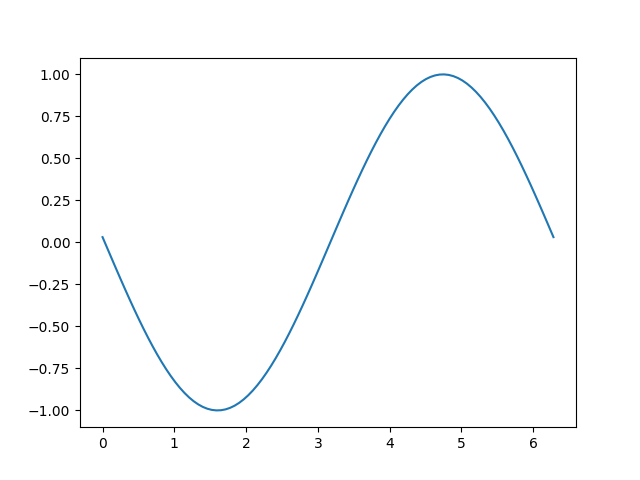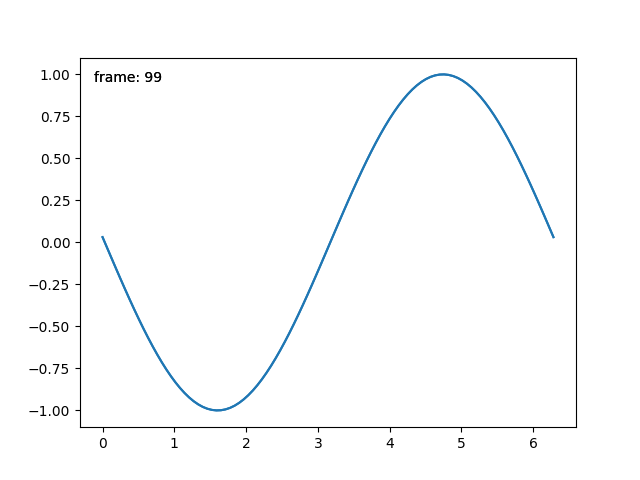笔记
单击此处 下载完整的示例代码
使用 blitting 更快地渲染#
Blitting是光栅图形中的一种标准技术,在 Matplotlib 的上下文中,可用于(大幅)提高交互式图形的性能。例如,
animationandwidgets模块在内部使用 blitting。在这里,我们演示了如何在这些类之外实现您自己的 blitting。
Blitting 通过将所有不变的图形元素渲染到背景图像中来加速重复绘制。然后,对于每次绘制,只需要在这个背景上绘制变化的元素。例如,如果 Axes 的限制没有改变,我们可以将包含所有刻度和标签的空 Axes 渲染一次,然后再绘制变化的数据。
策略是
准备恒定的背景:
绘制图形,但通过将其标记为动画来排除您想要动画的所有艺术家(请参阅
Artist.set_animated)。保存 RBGA 缓冲区的副本。
渲染单个图像:
恢复 RGBA 缓冲区的副本。
Axes.draw_artist使用/ 重绘动画艺术家Figure.draw_artist。在屏幕上显示生成的图像。
此过程的一个结果是您的动画艺术家总是被绘制在静态艺术家之上。
并非所有后端都支持 blitting。您可以通过该FigureCanvasBase.supports_blit属性检查给定的画布是否存在。
警告
此代码不适用于 OSX 后端(但适用于 mac 上的其他 GUI 后端)。
最小的例子#
我们可以使用这些FigureCanvasAgg方法
copy_from_bbox并
restore_region结合
animated=True我们的艺术家的设置来实现一个使用 blitting 加速渲染的最小示例
import matplotlib.pyplot as plt
import numpy as np
x = np.linspace(0, 2 * np.pi, 100)
fig, ax = plt.subplots()
# animated=True tells matplotlib to only draw the artist when we
# explicitly request it
(ln,) = ax.plot(x, np.sin(x), animated=True)
# make sure the window is raised, but the script keeps going
plt.show(block=False)
# stop to admire our empty window axes and ensure it is rendered at
# least once.
#
# We need to fully draw the figure at its final size on the screen
# before we continue on so that :
# a) we have the correctly sized and drawn background to grab
# b) we have a cached renderer so that ``ax.draw_artist`` works
# so we spin the event loop to let the backend process any pending operations
plt.pause(0.1)
# get copy of entire figure (everything inside fig.bbox) sans animated artist
bg = fig.canvas.copy_from_bbox(fig.bbox)
# draw the animated artist, this uses a cached renderer
ax.draw_artist(ln)
# show the result to the screen, this pushes the updated RGBA buffer from the
# renderer to the GUI framework so you can see it
fig.canvas.blit(fig.bbox)
for j in range(100):
# reset the background back in the canvas state, screen unchanged
fig.canvas.restore_region(bg)
# update the artist, neither the canvas state nor the screen have changed
ln.set_ydata(np.sin(x + (j / 100) * np.pi))
# re-render the artist, updating the canvas state, but not the screen
ax.draw_artist(ln)
# copy the image to the GUI state, but screen might not be changed yet
fig.canvas.blit(fig.bbox)
# flush any pending GUI events, re-painting the screen if needed
fig.canvas.flush_events()
# you can put a pause in if you want to slow things down
# plt.pause(.1)

此示例有效并显示了一个简单的动画,但是因为我们只抓取了一次背景,如果图形的像素大小发生变化(由于图形的大小或 dpi 变化),背景将无效并导致不正确(但有时看起来很酷!)图像。还有一个全局变量和相当数量的样板,这表明我们应该将它包装在一个类中。
基于类的示例#
我们可以使用一个类来封装样板逻辑和恢复背景、绘制艺术家、然后将结果blitting 到屏幕的状态。此外,我们可以使用'draw_event'
回调来捕获新背景,只要完全重新绘制发生正确处理调整大小。
class BlitManager:
def __init__(self, canvas, animated_artists=()):
"""
Parameters
----------
canvas : FigureCanvasAgg
The canvas to work with, this only works for sub-classes of the Agg
canvas which have the `~FigureCanvasAgg.copy_from_bbox` and
`~FigureCanvasAgg.restore_region` methods.
animated_artists : Iterable[Artist]
List of the artists to manage
"""
self.canvas = canvas
self._bg = None
self._artists = []
for a in animated_artists:
self.add_artist(a)
# grab the background on every draw
self.cid = canvas.mpl_connect("draw_event", self.on_draw)
def on_draw(self, event):
"""Callback to register with 'draw_event'."""
cv = self.canvas
if event is not None:
if event.canvas != cv:
raise RuntimeError
self._bg = cv.copy_from_bbox(cv.figure.bbox)
self._draw_animated()
def add_artist(self, art):
"""
Add an artist to be managed.
Parameters
----------
art : Artist
The artist to be added. Will be set to 'animated' (just
to be safe). *art* must be in the figure associated with
the canvas this class is managing.
"""
if art.figure != self.canvas.figure:
raise RuntimeError
art.set_animated(True)
self._artists.append(art)
def _draw_animated(self):
"""Draw all of the animated artists."""
fig = self.canvas.figure
for a in self._artists:
fig.draw_artist(a)
def update(self):
"""Update the screen with animated artists."""
cv = self.canvas
fig = cv.figure
# paranoia in case we missed the draw event,
if self._bg is None:
self.on_draw(None)
else:
# restore the background
cv.restore_region(self._bg)
# draw all of the animated artists
self._draw_animated()
# update the GUI state
cv.blit(fig.bbox)
# let the GUI event loop process anything it has to do
cv.flush_events()
下面是我们将如何使用我们的类。这是一个比第一种情况稍微复杂的例子,因为我们还添加了一个文本帧计数器。
# make a new figure
fig, ax = plt.subplots()
# add a line
(ln,) = ax.plot(x, np.sin(x), animated=True)
# add a frame number
fr_number = ax.annotate(
"0",
(0, 1),
xycoords="axes fraction",
xytext=(10, -10),
textcoords="offset points",
ha="left",
va="top",
animated=True,
)
bm = BlitManager(fig.canvas, [ln, fr_number])
# make sure our window is on the screen and drawn
plt.show(block=False)
plt.pause(.1)
for j in range(100):
# update the artists
ln.set_ydata(np.sin(x + (j / 100) * np.pi))
fr_number.set_text("frame: {j}".format(j=j))
# tell the blitting manager to do its thing
bm.update()

该类不依赖于pyplot并适合嵌入到较大的 GUI 应用程序中。
脚本总运行时间:(0分1.185秒)